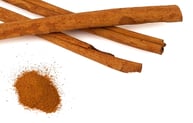 Cinnamon is a popular flavor commonly used around the world in many candies, foods and drinks. Current research shows that it might be valuable for more than just flavoring, though. (Image courtesy of Wikimedia Commons).
Cinnamon is a popular flavor commonly used around the world in many candies, foods and drinks. Current research shows that it might be valuable for more than just flavoring, though. (Image courtesy of Wikimedia Commons).
Researchers at the University of Arizona, Tucson have recently found that cinnamaldehyde, a compound derived from cinnamon, is able to inhibit colorectal cancer. Georg Wondrak and Donna Zhang of the University of Arizona Cancer Center have been studying the Nrf2 pathway, a molecular pathway that helps strengthen cells against different types of stress, such as carcinogen exposure.
|
RELATED ARTICLES: U of Arizona Receives $1M Donation for New Cancer Center Building |
Once they discovered that cinnamaldehyde induces the Nrf2 pathway, the Tucson researchers introduced cinnamaldehyde to the diets of mice, and saw that this diet addition was able to protect the mice from colorectal cancer.
"This is a significant finding. Because colorectal cancer is aggressive and associated with poor prognoses, there is an urgent need to develop more effective strategies against this disease," Donna Zhang, PhD of the UA Cancer Center explained.
Colorectal cancer is the third most common cancer in the United States, and is generally only treatable by surgery, chemotherapy, or radiation treatments.
"Given cinnamon’s important status as the third most consumed spice in the world, there’s relatively little research on its potential health benefits," explained Georg Wondrak, PhD of the UA Cancer Center. "If we can ascertain the positive effects of cinnamon, we would like to leverage this opportunity to potentially improve the health of people around the globe."

The University of Arizona, Tucson is ranked in the top 50 U.S. institutions for total R&D expenditures. This multi-million dollar research university continuously produces top-notch studies and research projects. Currently, the university has more than $76.8 million in active funding from the NIH and its affiliated organizations. This funding helps support research and establish new research buildings and centers.
Top funded departments at the university receiving substantial amounts of this NIH funding include:
- Internal Medicine and Medicine - $13.2 million
- Anatomy and Cell Biology - $8.6 million
- Pharmacology - $7.4 million
- Physiology - $7.4 million

With so much in funding supporting a wide variety of life science research projects, the University of Arizona is a thriving marketplace for laboratory suppliers to discuss their products with active scientists. Biotechnology Calendar, Inc. produces an annual BioResearch Product Faire™ Event in Tucson that does just that: provides lab suppliers with the opportunity to meet face-to-face with 100+ academic researchers in one place in only a few hours time.
Lab suppliers who attend this popular event are able to:
- Discuss tools and technologies with purchasing agents and end users to help them learn why your products are most beneficial to their research.
- Discover new quality leads in one place in only a few hours.
- Increase brand exposure in the Arizona academic marketplace.
The 13th Annual BioResearch Product Faire™ Event at the University of Arizona, Tucson will be held on November 19, 2015. To learn more about participating in this event, visit the link below:
Researchers in Arizona interested in learning about the best and newest tools and technologies available to their labs are encouraged to visit the link below to learn more about attending this complimentary event coming up in November, 2015:



